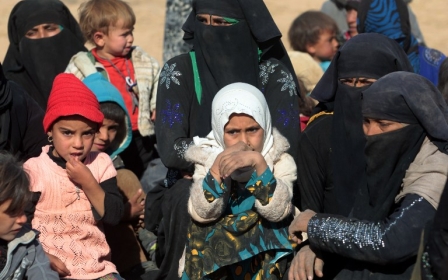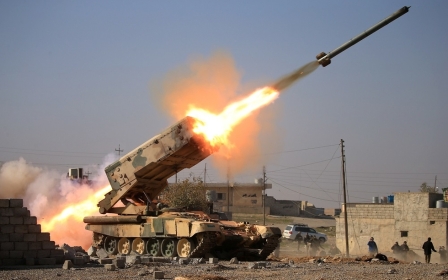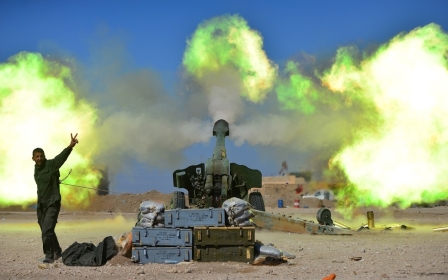Iraqi forces push deeper into western Mosul as civilians flee
US-backed Iraqi forces pushed deeper into western Mosul on Saturday after retaking the city's airport from the Islamic State group and punching into built-up areas of the militants' last major stronghold in the country.
Troops advanced in several more-populated, built-up southern districts, and about 1,000 civilians walked across the frontlines, the largest displacement since fighting began a week ago in a bid to deal Islamic State a decisive blow.
The new offensive comes after government forces and their allies finished clearing IS from eastern Mosul last month, confining the insurgents to the western sector of the city, which is bisected by the Tigris river.
Commanders expect the battle in western Mosul to be more difficult, in part because tanks and armoured vehicles cannot pass through the narrow alleyways that crisscross ancient districts of the city.
But Iraqi forces have so far made quick advances on several fronts, capturing the northern city's airport on Thursday, which they plan to use as a support zone, and breaching a three-metre high berm and trench set up by IS.
The advancing forces are now less than 3km from the mosque in Mosul's old city where in 2014 Islamic State leader Abu Bakr al-Baghdadi declared a caliphate spanning Iraq and Syria, sparking an international military campaign to defeat the group.
Losing Mosul would likely deal a hammer blow to the militants' dream of statehood, but they still control swaths of territory in Syria and patches of northern and western Iraq from where they could fight a guerrilla-style insurgency in Iraq and plot attacks on the West.
Federal police and an elite Interior Ministry unit known as Rapid Response have completely recaptured Hawi al-Josaq just north of the airport and begun clearing houses in the Tayyaran district, said Brigadier General Hisham Abdul Kadhim.
IS was resisting with snipers and roadside bombs, he said.
Separately, counter-terrorism forces were advancing on two directions towards Wadi Hajr and Mamoun districts, said Lieutenant General Abdelwahab al-Saadi, a senior commander.
"Clearing operations are ongoing and our forces have entered those areas," he told Reuters on a hill overlooking the battle.
Saadi said an IS suicide car bomb had been destroyed on Saturday morning before reaching its target.
Civilians flee
The campaign involves a 100,000-strong force of Iraqi troops, Shia militias and Sunni tribal fighters. It is backed by a US-led coalition that provides vital air support as well as on-the-ground guidance and training.
Western advisers are increasingly present close to the frontline, helping to coordinate air strikes and advising Iraqi forces as the battle unfolds.
The roughly one thousand civilians, mostly women and children, who walked out of southwestern parts of Mosul on Saturday climbed into military trucks taking them to camps further south.
The United Nations says up to 400,000 people may have to leave their homes during the new offensive as food and fuel runs out in western Mosul. Aid groups warned on Friday that the most dangerous phase of the offensive was about to begin.
Some of the people fleeing the Mamoun area said they were originally from Hammam al-Alil, south of Mosul, but were forced to move four months ago as IS retreated north into the city.
"They began shelling us arbitrarily, so we hid in the bathrooms. When the security forces came, they yelled to us so we fled to them," said civilian Mahmoud Nawwaf.
The government is encouraging residents to stay in their homes whenever possible, as they did in eastern Mosul, where fewer people fled than expected.
A Reuters correspondent near the airport saw nine families living in a house where residents with full beards served trays of tea to security forces. Some said IS had forced them to move from Samarra, 250km south of Mosul.
Abu Naba, 37, said he was surprised at how quickly the militants had been driven out.
"We could hear their voices outside, and 15 minutes later they were gone," he said.
A woman with a baby wrapped in a blanket on her lap said she had given birth in the house 22 days ago because it was too dangerous to reach a hospital.
Saudi FM visit
Saudi Foreign Minister Adel al-Jubeir was in Baghdad for talks on Saturday, the first such visit by a chief diplomat from the kingdom in years, Iraqi officials said.
He met his Iraqi counterpart, Ibrahim al-Jaafari, a foreign ministry official told AFP on condition of anonymity.
Another government official said it was the first visit to Baghdad by a Saudi foreign minister since 2003, marking a key step in efforts to mend frosty bilateral relations.
"This visit is to reestablish relations in a more stable way than previously," a senior government official said. "It's the first visit of its kind."
Iraq Prime Minister Haider al-Abadi, who has been at the helm since 2014, has supported efforts to improve strained ties.
Thamer al-Sabhan, whose credentials were received in January 2016, became the first Saudi ambassador to Iraq in a quarter century, after relations were cut following ex-president Saddam Hussein's invasion of Kuwait.
But he left the same year after Baghdad demanded he be removed following remarks he made to the press about an alleged plot to assassinate him and criticism he voiced of the Popular Mobilisation Units (PMUs)
The PMUs, also known as Hashd al-Shaabi, have played a key role in the fight against the Islamic State group. They are a paramilitary umbrella body dominated by Shia militia and seen by Riyadh as a proxy for arch-rival Iran.
New MEE newsletter: Jerusalem Dispatch
Sign up to get the latest insights and analysis on Israel-Palestine, alongside Turkey Unpacked and other MEE newsletters
Middle East Eye delivers independent and unrivalled coverage and analysis of the Middle East, North Africa and beyond. To learn more about republishing this content and the associated fees, please fill out this form. More about MEE can be found here.




